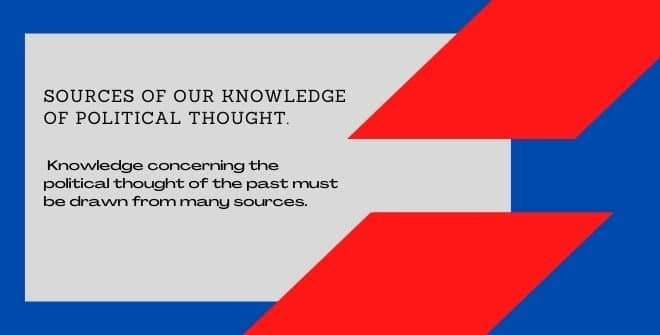Sources of Our Knowledge of Political Thought. Knowledge concerning the political thought of the past must be drawn from many sources. The theory of the state at any given time was not a simple and unanimous set of principles. On some questions there was such a consensus of political opinion as to justify one in speaking definitely of the political theory of the time. On other questions opponents were sharply divided, with the issue clearly defined. On still other questions thought was fragmentary and indecisive, and showed all shades of opinion.
In tracing the development of political thought, therefore, attention,must be focused chiefly on the doctrines that were so generally held that they formed a part of the intellectual atmosphere of their times, and upon the conflicting points of view as they centered around the dominant issues of each period.
The main source of our knowledge of political theory is the writings of those political philosophers who attempted to put into systematic form the political thought of their times. This includes a long list of conspicuous men from Plato to the present. Some devoted their attention exclusively to political philosophy; others dealt with the state incidentally as a part of their larger interest in philosophy as a whole. The writings of these men not only crystallized the thought of those who preceded them and of their own day, but they also frequently marked out new lines of theory that secured general adherence later.
The chief objection to depending exclusively upon this source is that it gives a history of political literature rather than of political thought. Political philosophers are often too much removed from practical political life, or too close to their own institutions to get a proper perspective, or too much influenced by past doctrines or by personal bias and prejudice to give a true picture of the political thought of their day. In any attempt to view political thought in connection with the history, institutions; and general intellectual background of its time, this source must, therefore, be supplemented by others.
Much political theory is never put into definite statement. It is found tacitly underlying the form of actual organization and methods, It is taken for granted, or sometimes deliberately suppressed. A study of the history of political institutions and of the actions and policies of states is therefore essential, as they occasionally show more clearly than words the actual principles that dominated men’s minds.
Quite often in political doctrines, as in other phases of human endeavor, a wide discrepancy is found between the principles professed and those that are acted upon. The political theory of the Middle Ages would certainly give a most unsatisfactory idea of the actual nature of medieval political institutions, and many motives that are influential in practical politics today are seldom put into party platforms or into campaign orations.
A knowledge of the general. intellectual background of each period is also essential to an understanding of political ideas. The thought of men in other fields affects their ideas concerning the state; hence the history of philosophy, of science, of religion, of ethics, and of economic theory contributes to the history of political thought.
A considerable amount of information concerning the theory of the state may be derived from the writings and speeches of men who occupy official positions in government, or who exercise leadership in public opinion. Such materials, though often colored for public consumption, nevertheless reveal, sometimes quite unintentionally, important political principles. They have both the merits and the defects that result from being in close contact with the realities of political life.
The official documents of states furnish a most valuable source of political thought. These include written constitutions, statutes and ordinances, court decisions, charters, departmental reports, treaties, diplomatic correspondence, state papers, and the like. Although these must be supplemented by observation of the actual practices of the states concerned, with which they do not always correspond, they are nevertheless an important guide to political theory.
In former times political thinking was limited to a comparatively small part of the population. The masses were ignorant and indifferent or suppressed. More recently, public opinion has come to play an important part in political thought and to exert a powerful influence in actual government. Accordingly, methods have been devised to influence it or to give it means of expression. Newspapers, magazines, pamphlets, posters, cartoons, and other forms of publicity have thus become important sources of political theory.
Finally, literature, in its narrower sense, often deals directly or indirectly with political life and problems. This is especially true of the essay, poetry, fiction, and the drama. Because they are less self-conscious and less partisan than the writings of political publicists, such sources may often give the truest picture of the political thought of a period.
Read More Related Article:
1.Origin of Political Thought
2.Political Thought and Political Institutions.
3.Problems of Political Thought.
4.Conservative and Critical Political Thought.
5.Value of Political Thought.

